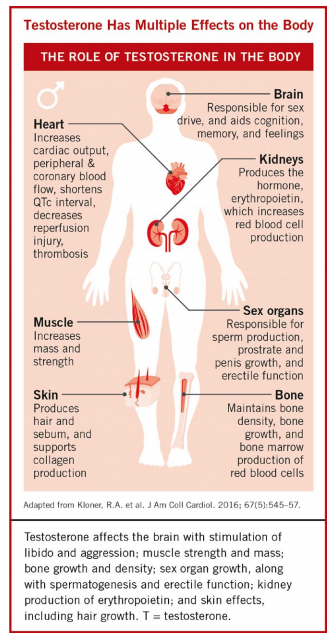What is testosterone?
Testosterone is a hormone present in both male and females – men having around 10 times more testosterone than women. Testosterone is produced primarily in the testes and is regulated by the pituitary gland and hypothalamus in the brain.
Testosterone helps men to develop male characteristics, such as a deep voice, body hair, increased skull and bone size, sexual libido and aggression. But also has broader functions in heart health, energy production, resilience (physical and psychological), and the functioning of the nervous and immune system. With an ageing population and increase in chronic diseases, low testosterone is on the rise.
Symptoms of low testosterone
These can be quite non-specific and could overlap with other medical problems, but include:
- Body hair loss or dull, dry hair
- Reduced muscle mass and strength
- Increased fat around the middle
- Depression and irritability
- Low energy and fatigue
- Poor memory and concentration
- Low libido and erectile dysfunction
- Low sperm count, motility and infertility
Whilst the prevalence of low testosterone in men is not known with absolute certainty, it is thought to affect 25% of the ageing male population over aged 40, and is commonly associated with poor health and comorbidities, such as cardiovascular disease, Type II diabetes and osteoporosis.

Causes and diagnosis
Hypogonadism is a medical term that refers to insufficient testicular testosterone, which could be caused by a problem with the testes or the brain pathways regulating the hormone, medical treatments such as cancer drugs, removal of a testicle, some underlying inflammatory response, or alcohol abuse. There is also a rare genetic condition of androgen resistance, where the body is resistant to testosterone which causes problems with sexual maturity, puberty and fertility.
Total testosterone levels can be checked via a blood test, usually on two separate occasions, in the morning whilst in a fasted state. A result lower than 8 nmol/l usually requires testosterone therapy, a result between 8-12 nmol/l, is considered borderline, and over 12 would not require any treatment.
Lifestyle factors
Hormonal dysfunction can also be caused by problems in other body systems such as the nervous, immune, digestive systems, which then display an imbalance in hormones, as the body tries to adapt to some environmental assault. Common lifestyle factors implicated with low
testosterone include:
- Overweight and obesity
- Underweight/low body fat e.g. anorexia nervosa
- High blood sugar/insulin resistance
- High physical or psychological stress resulting in raised cortisol
- Chronic low grade inflammation
- Low thyroid function
- Certain medications such as statins
- Environmental toxins such as plastic or phytoestrogens, smoking
These influences and disrupt the ratio between testosterone and oestrogen which can be the underlying problem, rather than lack of testosterone being produced. Maintaining a healthy body weight, reducing stress and supporting our liver to be able to efficiently metabolise our hormones may in themselves correct a lot of the symptoms associated with a hormone imbalance, particularly as we age. Nutrients such as zinc and selenium are particularly important for healthy sperm, found in meat, fish, nuts and seeds.
By increasing awareness of hormonal imbalance in men, just as in women, seeking out support from a GP or health coach, treatments and lifestyle change can help improve and alleviate symptoms which are not always just down to ageing.
For more information, or personalised support, contact our nutritionist Julie, at julie@wearewellbeing.co.uk, for a free 30 minute discussion on how nutrition and lifestyle can support your symptoms.







